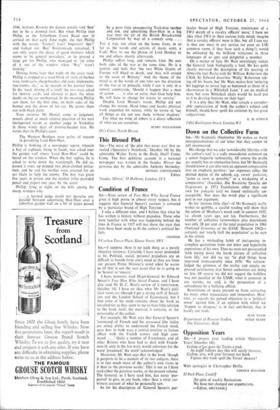Down on the Collective Farm
SIR,—Mr Szamuely (September 30) makes so many misrepresentations of our letter that they cannot be left unanswered.
His charge that we take 'considerable liberties with the author's text' is a sadly unacademic comment on a minor linguistic technicality. Of course the prefix po- usually has an attenuative force, but Mr Szamuely should know it can also turn an apparent comparative into an emphatic positive: `po- expresses either the desired degree of the adverb, e.g. vends poskoree, "come as soon as possible," or a weakening of a comparative.' (Isacenko, Die Russische Sprache der Gegenwart, p. 157.) Translations other than our own for polegshe (sic) we found stylistically un- acceptable. Nor does the word play a significant part in our argument.
As for `curious little slips'—if Mr Szamuely really wishes to quibble, a careful reading will show that the action of Mozhaev's novel ends in autumn 1955, i.e. eleven years ago, not ten. Furthermore, the number of collective farmworkers plus dependants was only 28 per cent of the total population in 1961 (National Economy of the USSR, Moscow 1962)— certainly not `nearly half the population' as be says in his article.
He has a misleading habit of juxtaposing in- complete quotations from our letter and hyperbolic expressions of his own. Thus we were not preoccupied 'with toning down the harsh picture of collective farm life,' nor did we say 'be glad things have improved immeasurably since 1956.' We acknow- ledged the grimness of the reality and simply ex- pressed satisfaction that Soviet authorities are doing no less. Of course we did not suggest the kolkhoz was not peculiar to the USSR; what is common in any society, we said, is the persecution of a subordinate by a bullying official.
Restrictions of space prevent us from correcting his many other inaccuracies and innuendoes. How- ever, as regards his pained objection to a 'political smear' against him, if an opinion with which we `happen to disagree,' is in fact anti-Soviet, that is hardly our fault.
Department of Russian Studies, PETER HENRY The University, Hull
ALAN WOOD


































 Previous page
Previous page